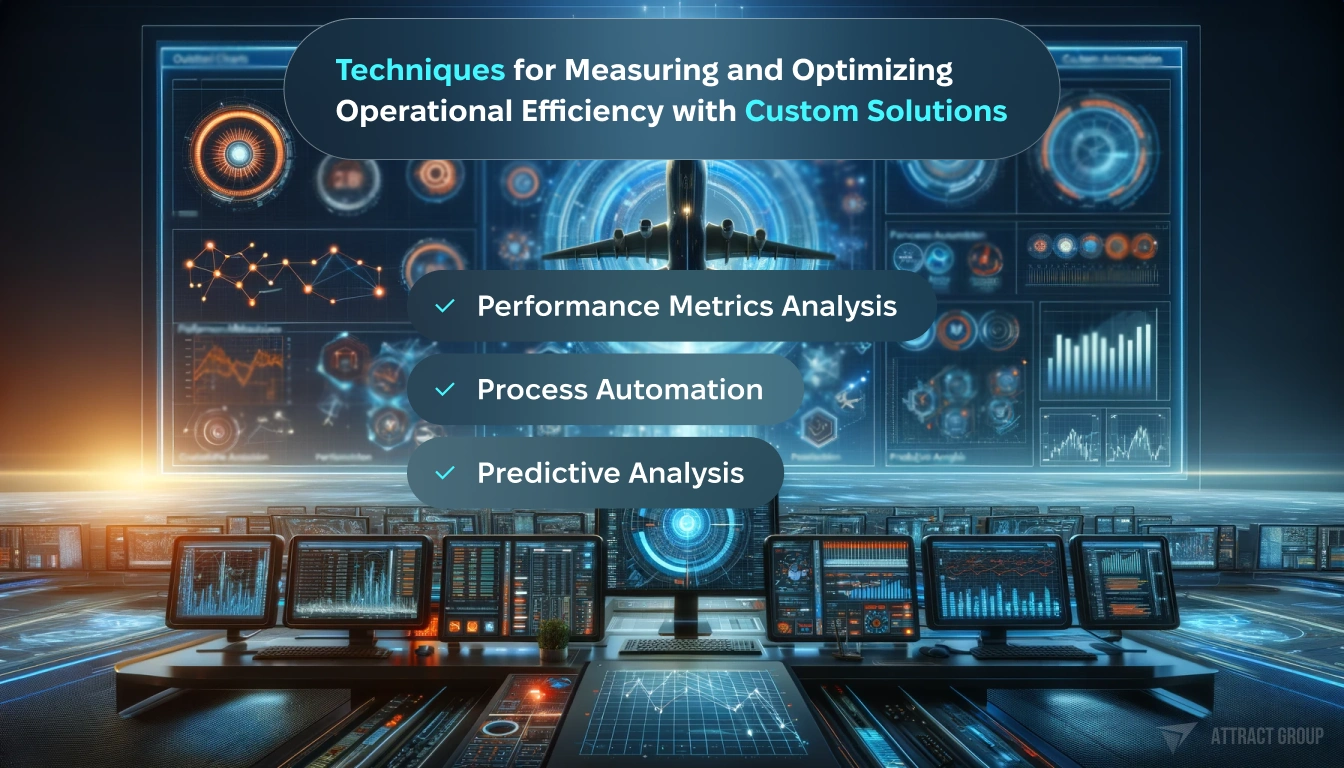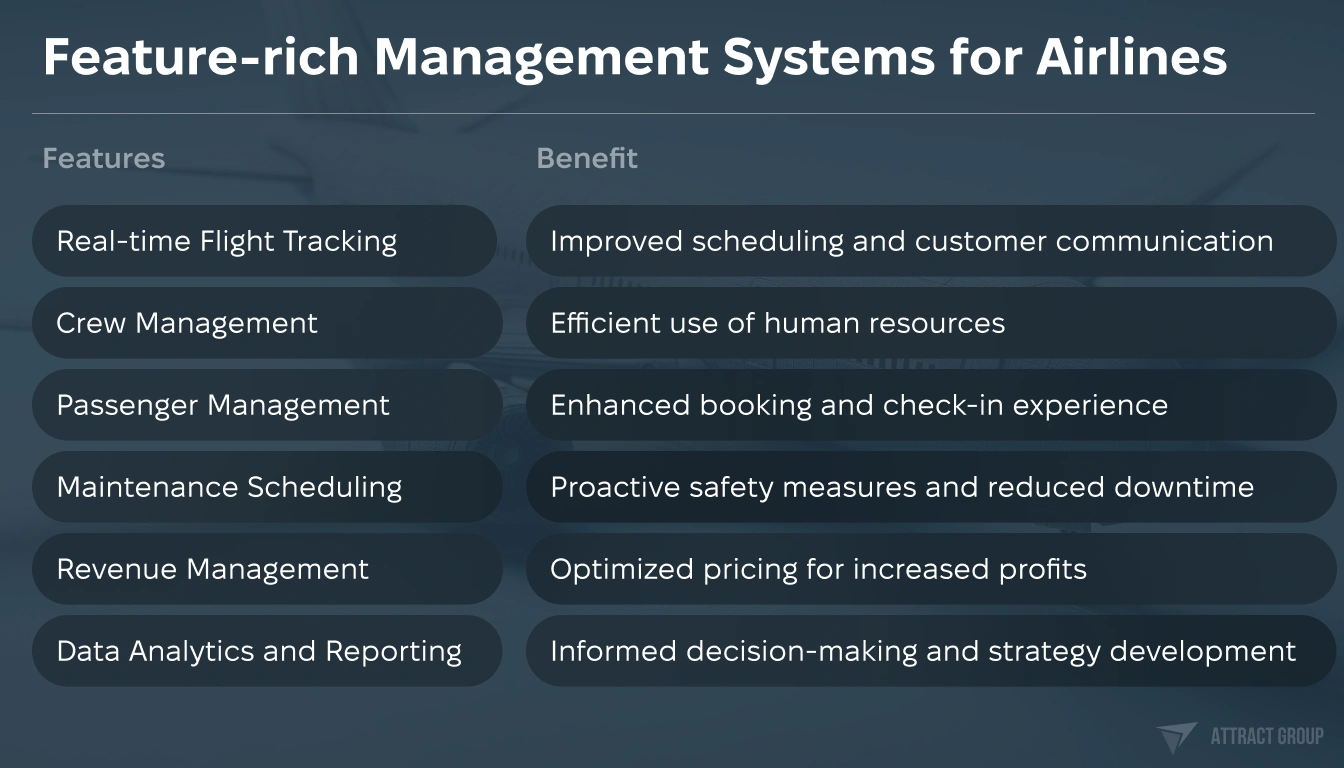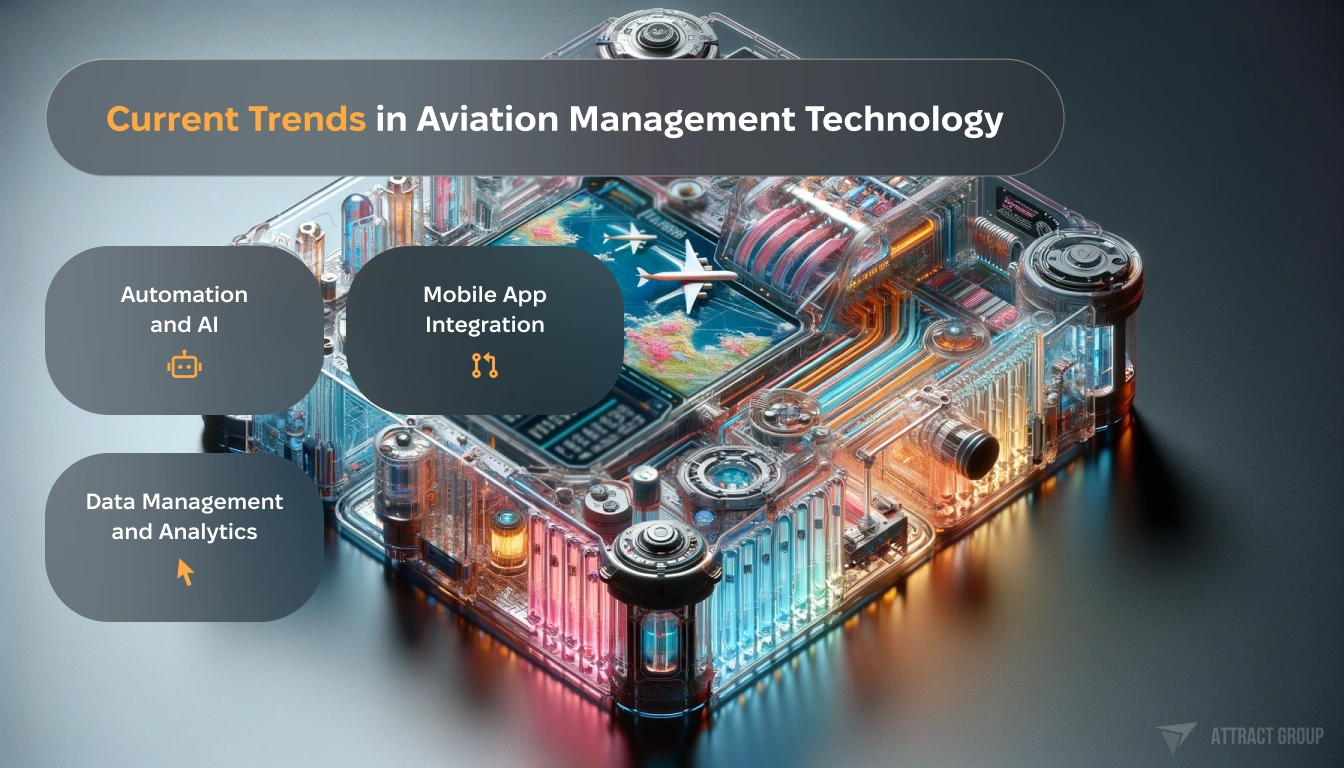The Power of Custom Aviation Software Development: Benefits and Features
 20 November 2023
20 November 2023The aviation industry is undergoing a significant transformation driven by the adoption of custom airline management systems. This shift from generic to bespoke solutions is not just a trend but a response to airline operations’ evolving complexities and unique challenges. Customization in airline management software is becoming crucial to meet the specific needs of each airline, emphasizing efficiency, scalability, and personalized service delivery.
A report by Statista highlights that the global market size for airline software is projected to reach $7.81 billion by 2025, underlining the growing demand for tailored technological solutions in this sector. This evolving landscape sets the stage for a new era in aviation, where custom solutions are beneficial and essential for operational excellence and competitive advantage.
Custom Airline Management Systems: A Paradigm Shift
The Evolution from Generic to Custom Solutions in Aviation Technology
The aviation industry, a complex and dynamic realm, has long relied on generic management systems. These one-size-fits-all solutions, while foundational, often fell short in addressing the unique needs and challenges of individual airlines. The paradigm shifts towards custom airline management systems, marking a significant evolution in aviation technology.

Historically, airlines had to adapt their operations to the limitations of available software. This often led to inefficiencies, as the software was not designed with the specific airline’s operational model, scale, or strategy in mind. However, with technological advancements and a deeper understanding of the aviation landscape, the focus has shifted to developing systems tailored to each airline’s distinct requirements.
Why Custom is Becoming the New Standard for Airline Management Platforms
Customization in airline management systems is becoming necessary. The ability to tailor software to the specific needs of an airline offers numerous benefits:
- Improved Efficiency: Custom systems streamline operations, from flight scheduling to crew management, reducing manual errors and saving valuable time.
- Enhanced User Experience: Systems designed with the end-user in mind, whether airline staff or customers, provide a more intuitive and practical experience.
- Flexibility and Scalability: Tailored solutions can grow with the airline, accommodating changes in size, scope, and market conditions.
- Integration Capabilities: Custom systems can seamlessly integrate with existing technologies, creating a cohesive technological ecosystem within the airline.
This shift towards customization is not just a trend but a reflection of a more profound understanding within the aviation industry that each airline’s needs are unique and require specific solutions. As the industry continues to evolve, custom airline management systems are set to become the new standard, driving efficiency, innovation, and growth in the aviation sector.
Tailored Software Solutions in Aviation
The Concept and Advantages of Personalized Airline Software
In the world of aviation, personalized airline software is revolutionizing how airlines operate. Customized solutions cater specifically to each airline’s unique operational processes, preferences, and goals. This personalization extends from front-end features like booking and check-in interfaces to back-end functionalities such as crew scheduling and maintenance tracking.
The advantages of these tailored solutions are manifold:
- Increased Operational Efficiency: Personalized software can streamline various operational processes, reducing the time and effort required to manage day-to-day tasks.
- Enhanced Customer Experience: By tailoring the booking and check-in process, airlines can offer passengers a more user-friendly and enjoyable experience.
- Better Data Insights: Custom software can provide more relevant and precise data analytics, allowing airlines to make informed decisions and improve their services.

How Customization is Revolutionizing Airline Management Systems
Customization in airline management systems is more than just a technological upgrade; it’s a complete overhaul of how airlines operate. By leveraging the power of custom software, airlines can achieve:
| Target | Description |
|---|---|
| Optimized Resource Management | Efficient allocation and utilization of resources such as aircraft and crew. |
| Improved Decision Making | Access to tailored data and analytics enables better strategic decisions. |
| Flexibility and Adaptability | The ability to quickly adapt to changing market conditions and regulatory requirements. |
Receive a free quote and discover how custom aviation software can transform your airline’s operations and customer experience
This focus on customization is not just about keeping up with technological advancements but redefining the essence of airline operations. Personalized airline software stands at the forefront as the aviation industry evolves, leading the charge toward a more efficient, customer-centric, and data-driven future.
Enhancing Airline Operations Efficiency
The Role of Custom Aviation Software in Streamlining Operations
Custom aviation software plays a pivotal role in enhancing the efficiency of airline operations. Tailored to meet each airline’s specific demands and workflows, these systems offer a level of precision and efficiency that generic systems cannot match. This personalized approach enables airlines to optimize everything from flight scheduling and crew management to customer service and maintenance protocols.
Key areas where custom software significantly impacts operational efficiency include:
- Flight and Crew Scheduling: Automated and optimized scheduling reduces delays and maximizes the use of resources.
- Maintenance and Safety Operations: Customized systems ensure timely maintenance and adherence to safety regulations, crucial for minimizing downtime and ensuring passenger safety.
- Real-time Data Processing: The ability to process and analyze data in real-time aids in making swift, informed decisions that can significantly improve operational efficiency.
Techniques for Measuring and Optimizing Operational Efficiency with Custom Solutions
Measuring and optimizing operational efficiency involves combining data analysis, continuous improvement processes, and leveraging the right technological tools. Techniques include:
- Performance Metrics Analysis: Custom software can generate specific metrics that help identify improvement areas.
- Process Automation: Automating repetitive and time-consuming tasks frees up resources and reduces the likelihood of human error.
- Predictive Analysis: Advanced algorithms can forecast potential issues, allowing preemptive action to avoid disruptions.

Schedule a free session to explore how custom aviation software can streamline your operations and elevate your airline’s efficiency
Integrating custom software solutions in airline operations isn’t just about keeping pace with technology; it’s about proactively enhancing every aspect of the airline’s functioning. With the right custom solutions, airlines can achieve operational efficiency that boosts performance and provides a significant competitive edge in the fast-paced aviation industry.
Feature-rich Management Systems for Airlines
Custom airline management systems must include a range of features to cater to the complex and varied needs of airlines. These features enhance operational efficiency, improve passenger experience, and ensure seamless management across various departments. Key features include:
- Real-time Flight Tracking: Monitor flights for efficient scheduling and passenger updates.
- Crew Management: For optimal allocation of crew members based on skills, availability, and legal requirements.
- Passenger Management: This includes booking, check-in, and personalized customer service.
- Maintenance Scheduling: Automated tracking of aircraft maintenance needs for safety and efficiency.
- Revenue Management: Dynamic pricing and yield management for maximized profitability.
- Data Analytics and Reporting: For insightful decision-making based on accurate, real-time data.
The impact of these features on airline operations is profound:
- Operational Efficiency: Streamlined processes and reduced manual intervention significantly save time and cost.
- Enhanced Customer Satisfaction: Improved passenger management results in a better travel experience.
- Safety and Compliance: Regular maintenance and adherence to regulatory standards ensure safety and compliance.
These features are not just individual components but part of an interconnected system that works synergistically to optimize airline operations. By integrating these features into their management systems, airlines can achieve operational excellence that sets them apart in the competitive aviation industry.

Benefits of Customized Airline Software
Customized airline software, tailored specifically for the aviation industry, offers many tangible and intangible benefits. These benefits not only enhance operational efficiency but also contribute significantly to the overall success of the airline.
Tangible Benefits
- Increased Efficiency: Custom software solutions streamline airline operations, from flight operations management to crew management, leading to significant time and cost savings.
- Enhanced Revenue Management: Tailored revenue management systems enable airlines to optimize pricing strategies, maximizing profitability.
- Improved Safety and Security: Custom solutions ensure adherence to regulatory requirements and enhance safety measures.
Intangible Benefits:
- Competitive Edge: Custom aviation software development services give airlines a unique advantage in a highly competitive market.
- Customer Satisfaction: Personalized and efficient services increase customer satisfaction and loyalty.
- Adaptability: The ability to quickly adapt to changes in the aviation business and regulatory landscape.
Impact Studies: Before and After Adoption of Custom Management Systems in Airlines
The transformation seen in airlines after the adoption of custom software is substantial. For example, a study might show that after implementing a custom reservation system and departure control system, an airline experienced a 30% increase in operational efficiency and a 20% increase in customer satisfaction ratings.
Incorporating custom aviation software development solutions into the airline management system transforms the operational landscape, improving efficiency, customer satisfaction, and profitability. This alignment of technology with business goals is essential for airlines to thrive in the dynamic aviation industry.
Airline Operations Optimization with Custom Software
Strategies for Optimizing Various Airline Operations Through Customization
Optimizing airline operations through customized software solutions involves several key strategies, each targeting different aspects of airline management. By leveraging custom aviation software development services, airlines can achieve high operational excellence.
Key Strategies for Optimization
- Streamlining Airport Operations: Implementing custom solutions for airport operations management, such as efficient parking reservation systems and streamlined airport terminal processes.
- Enhancing Flight Operations Management: Utilizing custom flight plans and departure control systems to optimize flight schedules and ensure on-time departures.
- Advanced Crew Management: Integrating crew management software to manage crew schedules effectively reduces fatigue and ensures compliance with regulatory requirements.
- Optimizing Ticketing and Reservation Systems: Developing custom airline ticketing and reservation systems to improve booking experiences and increase sales efficiency.
Incorporating these strategies into airline operations ensures smoother day-to-day management and positions airlines to better handle the complexities and challenges of the modern aviation business. Custom software solutions developed by experienced aviation software development companies are the key to unlocking this potential, ensuring that airlines meet and exceed their operational goals.
Learn more about how embracing innovative management platforms can prepare your airline for tomorrow’s challenges and opportunities
Aviation Management Technology: Current Trends
The aviation industry is constantly evolving, with new technological advancements shaping the future of airline management systems. These advancements are not just incremental improvements but are setting new benchmarks in operational efficiency and customer service.
Current Trends in Aviation Management Technology
- Automation and AI: Incorporating automation and artificial intelligence to streamline processes and make predictive decisions
- Mobile App Integration: Development of mobile apps for enhanced passenger experience, from online check-in to real-time flight updates.
- Data Management and Analytics: Advanced data management systems and analytics tools offer deep insights into operations, helping optimize and strategic planning.

How These Trends are Influencing the Development of Custom Software Solutions
These technological trends are significantly influencing the development of custom aviation software solutions. Airlines are now seeking aviation software development services that can integrate the latest technologies into their operations, ensuring that they stay ahead of the curve.
- Customizable User Interfaces: Tailored UI/UX design in software applications, enhancing user experience and interaction.
- Cloud-based Solutions: Adoption of cloud services for better data security and management, offered by expert DevOps and cloud service providers.
- Compliance with Regulatory Standards: Software solutions designed to meet the specific regulatory requirements of the aviation industry, including Federal Aviation Administration (FAA) standards and advisory circulars.
These trends highlight the importance of staying updated with the latest advancements in technology for the aviation industry. Custom software development companies specializing in aviation solutions are instrumental in translating these trends into practical, efficient, and compliant software systems, ensuring that airlines meet current demands and are prepared for future challenges.
Scalable Airline Systems: Growing with the Business
The scalability of airline management systems is crucial for adapting to changing business sizes and market demands. Customized software solutions offer this flexibility, ensuring that as an airline grows, its management system can efficiently scale up to accommodate increased operations, passenger traffic, and evolving business models.
This scalability is vital for maintaining operational efficiency and competitive advantage in the dynamic aviation industry. Integrating scalable solutions allows airlines to seamlessly expand their services and capabilities, aligning with their growth trajectory and future expansion plans.
Explore how our expertise can elevate your business, and get the best of services today!.
Personalized Airline Software: Meeting Unique Needs
Personalized airline software caters to individual airlines’ unique challenges and requirements, offering customized solutions that align closely with their specific operational and business needs. This personalization ensures that every aspect of airline management, from ticketing systems to crew scheduling, is precisely tailored to optimize efficiency and performance.
By addressing the distinct characteristics of each airline, custom software enhances operational effectiveness and provides a competitive edge in the market.
The Future of Airline Management Platforms
The future of airline management platforms is poised to be shaped by continuous innovation and technological advancements. As the industry evolves, these systems are expected to become even more intelligent, integrated, and user-centric. The focus will likely be on enhancing real-time data processing, incorporating cutting-edge technologies like AI and IoT, and further personalizing the passenger experience.
This forward-looking approach will streamline operations and open new avenues for revenue generation and customer engagement. Airlines that actively invest in and adapt to these emerging technologies will be well-positioned to lead in efficiency, safety, and customer satisfaction.

Conclusion
In summarizing the case for custom airline management systems, it’s clear that these solutions are integral to defining the future of airline operations. The shift towards tailored, technologically advanced systems is not just a trend but a necessary evolution in response to the aviation industry’s growing complexities and unique demands.
Speak to our experts to discover how custom airline management systems can transform your operations and help you soar above the competition
Custom airline management systems offer a range of benefits, from enhanced operational efficiency and customer satisfaction to scalability and competitive advantage.
The integration of these systems represents a strategic investment in the airline’s future, ensuring adaptability and resilience in a rapidly changing market. As the industry continues to evolve, airlines equipped with custom solutions will be at the forefront, leading innovation, efficiency, and customer service.









